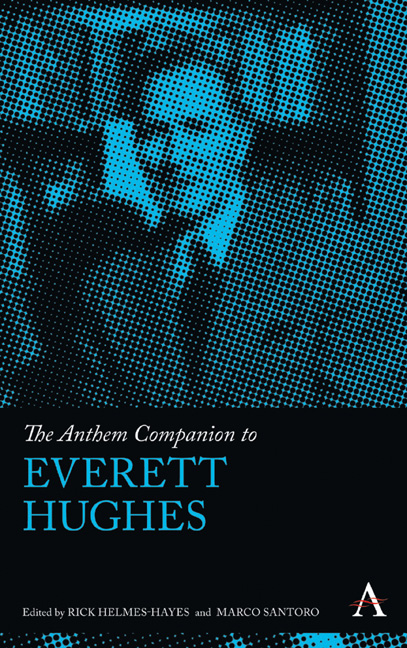Book contents
- Frontmatter
- CONTENTS
- List of Illustrations
- Foreword Everett C. Hughes, Great Teacher
- Insight through Craftsmanship: The Sociological Legacy of Everett Hughes
- Chapter One Everett Hughes and the Chicago Tradition
- Chapter Two Studying “Going Concerns”: Everett C. Hughes on Method
- Chapter Three The Natural History of Everett Cherrington Hughes: A Master of Fieldwork
- Chapter Four Everett C. Hughes: A Key Figure of the Canadian Chicago School Diaspora
- Chapter Five Everett Hughes: Notes from an Apprentice
- Chapter Six An American in Frankfurt: Everett C. Hughes's Unpublished Book on Germans after the End of the Nazi Regime
- Chapter Seven The Origins and Evolution of Everett Hughes's Concept: ‘Master Status’
- Chapter Eight Discovering the Secret of Excellence: Everett Hughes as a Source of Inspiration in Researching Creative Careers
- Chapter Nine Everett Hughes on Race: Wedded to an Antiquated Paradigm
- Notes on Contributors
- Index of Names
- Index of Subjects
Chapter Two - Studying “Going Concerns”: Everett C. Hughes on Method
Published online by Cambridge University Press: 17 June 2017
- Frontmatter
- CONTENTS
- List of Illustrations
- Foreword Everett C. Hughes, Great Teacher
- Insight through Craftsmanship: The Sociological Legacy of Everett Hughes
- Chapter One Everett Hughes and the Chicago Tradition
- Chapter Two Studying “Going Concerns”: Everett C. Hughes on Method
- Chapter Three The Natural History of Everett Cherrington Hughes: A Master of Fieldwork
- Chapter Four Everett C. Hughes: A Key Figure of the Canadian Chicago School Diaspora
- Chapter Five Everett Hughes: Notes from an Apprentice
- Chapter Six An American in Frankfurt: Everett C. Hughes's Unpublished Book on Germans after the End of the Nazi Regime
- Chapter Seven The Origins and Evolution of Everett Hughes's Concept: ‘Master Status’
- Chapter Eight Discovering the Secret of Excellence: Everett Hughes as a Source of Inspiration in Researching Creative Careers
- Chapter Nine Everett Hughes on Race: Wedded to an Antiquated Paradigm
- Notes on Contributors
- Index of Names
- Index of Subjects
Summary
What principles shall guide us in the discovery of men’ secrets; what, in the telling of them?
(Hughes 1971 [1956], 431)Introduction
In North America, during the middle decades of the twentieth century, the work of Everett Hughes (1897–1983) was central to a wide range of disciplinary sub-specialties, including race and ethnic relations, work and occupations, and education. Beginning in the early 1970s, he became subject to considerable critical attention from US scholars eager to examine his legacy (Baker 1976; Becker et al., eds. 1968; Burns 1980; Coser 1994; Daniels 1972; Faught 1980; Fielding 2005; Heath 1984; Holmstrom 1984; Reinharz 1995; Riesman 1983; Riesman and Becker 1984; Simpson 1972; Strauss 1996; Weiss 1997). In Europe, by contrast, Hughes had no such profile. Only after his death in 1983, in the context of a growing, if belated, interest in the general legacy of the Chicago School (see Rémy and Voyé 1974; Grafmeyer and Joseph, eds 1979), did French and, now, Italian scholars begin to pay appreciative attention to his work (Hannerz 1983; Peneff 1984; Winkin 1988; Coulon 1992; Sociétés contemporaines27 [juillet] 1997, entire issue; Wax 2000; Chapoulie 2001). Much of this attention grew out of an interest in Hughes’ contribution to the development of interpretive sociology and fieldwork (Chapoulie 1987, 1996a, 1996b: 11).
Purpose
The purpose of this paper is to outline Hughes’ “methodological orientation,” including his conception of fieldwork (Platt 1997; see also Platt 1996, 1998; Chapoulie 1987, 1996a, 1996b, 2000), bearing in mind the mutually constitutive relationship in his work between theory and method and his conception of research ethics.
Preliminary Observations
Hughes regarded the fostering of fieldwork as among his primary responsibilities and crowning achievements and expressed the wish that his students and colleagues would build on this aspect of his legacy. It is surprising, then, that he never wrote a systematic overview of issues of epistemology, ontology and their relations to theory and method or, even, a practical ‘how-to’ field manual (Hughes 1971, vi). This does not mean that he was methodologically naïve. Quite the opposite. He was a key combatant in the heated battles that took place in American sociology beginning in the 1940s regarding the respective merits of quantitative/statistical and qualitative/ fieldwork methodologies.
- Type
- Chapter
- Information
- The Anthem Companion to Everett Hughes , pp. 71 - 92Publisher: Anthem PressPrint publication year: 2016

